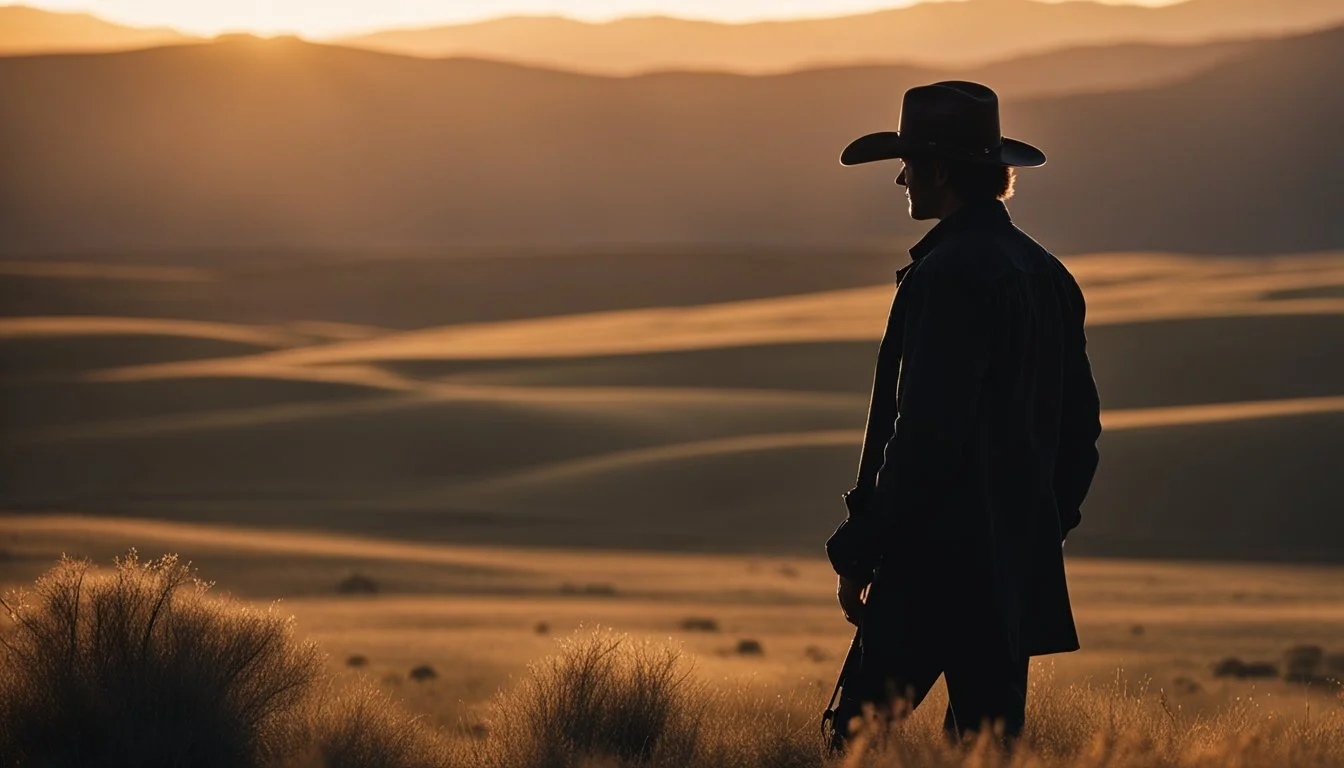7 Controversial Documentaries on Tom Horn's Complex Legacy
Unraveling the Myth of a Western Icon
Tom Horn remains a controversial figure in American frontier history. His life as a scout, lawman, and hired gun has captivated historians and Wild West enthusiasts for over a century. Horn's complex legacy continues to spark debate and intrigue, inspiring numerous documentaries that explore different aspects of his tumultuous life and infamous death.
These documentaries delve into the multifaceted nature of Tom Horn's character, examining his roles as both a feared gunslinger and a skilled tracker. They offer varying perspectives on key events in his life, including his involvement in range wars and his controversial trial and execution. By presenting diverse viewpoints and uncovering new evidence, these films contribute to the ongoing discussion about Horn's true nature and his place in Western folklore.
1) 'The Legend of Tom Horn' by Don Russell (1980)
'The Legend of Tom Horn' offers a balanced look at the controversial figure's life and legacy. Directed by Don Russell, this documentary explores Horn's multifaceted career as a scout, cowboy, and lawman.
The film delves into Horn's early years, examining his time as an Army scout and interpreter. It then traces his progression to becoming a Pinkerton detective and later a hired gun in Wyoming.
Russell's documentary presents interviews with historians and descendants of those who knew Horn. These firsthand accounts provide valuable insights into the man behind the legend.
The film addresses the controversial aspects of Horn's life, including his alleged involvement in numerous killings. It examines the circumstances surrounding his arrest and trial for the murder of Willie Nickell.
'The Legend of Tom Horn' stands out for its effort to present a nuanced portrayal of its subject. It avoids sensationalism while exploring the complexities of Horn's character and the era he lived in.
More information on 'The Legend of Tom Horn' documentary
2) 'Tom Horn: Blood on the Moon' by Chip Carlson
'Tom Horn: Blood on the Moon' is a meticulously researched book by historian Chip Carlson. Published in 2001, it delves into the controversial life and death of Tom Horn, a notorious figure in the American Old West.
Carlson, a Wyoming resident for 40 years, is considered one of the world's leading experts on Tom Horn. His book examines the complex legacy of Horn, who was hanged in 1903 for the murder of a 14-year-old boy.
The author presents new findings that challenge Horn's conviction, suggesting he may have been wrongfully executed. Carlson's work explores the tensions between cattle barons and homesteaders in late 19th-century Wyoming.
The book provides a detailed account of Horn's life, from his early days to his various occupations, including his role as a hired gun for cattle companies. It offers a balanced perspective on Horn's controversial actions and the circumstances surrounding his trial.
Carlson's thorough research and compelling narrative shed new light on this contentious chapter of Western history, inviting readers to question long-held assumptions about Tom Horn's guilt.
3) 'Tom Horn: Last Cowboy Standing' by Larry Ball (2014)
'Tom Horn: Last Cowboy Standing' offers a balanced examination of the controversial figure's life and legacy. Larry Ball's documentary explores Horn's multifaceted career as a scout, lawman, and hired gun.
The film delves into Horn's early years and his involvement in the Apache Wars. It highlights his reputation as a skilled tracker and his work for the Pinkerton Detective Agency.
Ball's documentary addresses the controversial aspects of Horn's life, including his role as a "range detective" for cattle barons. It examines the circumstances surrounding the murder of Willie Nickell, for which Horn was convicted and executed.
The film features interviews with historians and descendants of those involved in Horn's story. It presents various perspectives on his guilt or innocence in the Nickell case.
'Tom Horn: Last Cowboy Standing' provides viewers with a nuanced portrayal of a complex figure in Western history. It encourages audiences to consider the broader context of Horn's life and the era in which he lived.
4) 'Life of Tom Horn, Government Scout and Interpreter' by Tom Horn
Tom Horn's autobiography, published posthumously in 1904, offers a firsthand account of his life as a government scout and interpreter. The book provides insights into Horn's experiences during the Apache Wars and his work with notable military figures.
Horn details his involvement in tracking Geronimo and other Apache leaders. He recounts dangerous missions and close encounters with Native American warriors, painting a vivid picture of frontier life in the late 19th century.
The autobiography also covers Horn's early years and his path to becoming a skilled tracker and linguist. It sheds light on his relationships with Army officers and his role in negotiations between the U.S. government and Apache tribes.
While the book offers valuable historical information, readers should approach it with a critical eye. Horn's account may be biased or embellished, as it was written while he awaited execution for a murder conviction.
'Life of Tom Horn' remains a controversial yet significant document in understanding the complex figure of Tom Horn and the tumultuous era of the American West.
Learn more about Tom Horn's life and legacy
5) 'The Trials of Tom Horn' documentary (2010)
'The Trials of Tom Horn' examines the controversial legal proceedings surrounding the infamous frontier figure. The documentary delves into Horn's 1902 trial for the murder of Willie Nickell, a case that remains hotly debated to this day.
Featuring interviews with historians and legal experts, the film explores the evidence presented against Horn and the questionable tactics used by the prosecution. It highlights the political pressure and media frenzy that surrounded the trial.
The documentary also covers Horn's earlier life as a scout, interpreter, and Pinkerton detective. It provides context for his reputation as a skilled tracker and ruthless enforcer in the range wars of Wyoming.
'The Trials of Tom Horn' presents a balanced look at the conflicting accounts of Horn's guilt or innocence. It raises questions about the fairness of his trial and the reliability of key witness testimonies.
More information on 'The Trials of Tom Horn' documentary
6) 'Who Killed Tom Horn?' docuseries (2020)
This docuseries reexamines the controversial trial and execution of Tom Horn. It explores new evidence and perspectives on the case that has puzzled historians for over a century.
The series features interviews with experts and descendants of key figures involved in Horn's story. It delves into the political climate of Wyoming at the turn of the 20th century and its impact on Horn's fate.
Viewers are presented with alternative theories about Willie Nickell's murder. The docuseries questions the reliability of Horn's alleged confession and examines the possibility of a frame-up by powerful cattle barons.
'Who Killed Tom Horn?' also sheds light on Horn's complex personality and his roles as a scout, lawman, and hired gun. It provides context for his actions within the changing landscape of the American West.
The series aims to present a balanced view of Horn's life and legacy, allowing viewers to draw their own conclusions about his guilt or innocence.
More information on 'Who Killed Tom Horn?' docuseries
7) 'Tom Horn: The Man Who Lived Twice' documentary (2009)
This documentary explores the controversial life of Tom Horn, a figure known for his multiple roles in the American Old West. The film delves into Horn's varied career as a scout, lawman, and hired gun.
It examines the events leading up to Horn's conviction for the murder of Willie Nickell in 1901. The documentary presents evidence and arguments both supporting and questioning Horn's guilt in this case.
'The Man Who Lived Twice' also covers Horn's earlier life, including his time as an Army scout and his work for the Pinkerton Detective Agency. It highlights his reputation as a skilled tracker and marksman.
The film features interviews with historians and experts on Western history. It incorporates archival footage and photographs to bring Horn's era to life.
This documentary aims to present a balanced view of Horn's complex legacy. It encourages viewers to consider the various aspects of his life and the controversies surrounding his actions and eventual execution.
Understanding Tom Horn's Impact
Tom Horn left an indelible mark on the American West through his controversial life and actions. His legacy continues to spark debate and fascination over a century later.
Historical Background
Tom Horn worked as a scout, cowboy, and Pinkerton detective in the late 1800s. His skills as a tracker and gunman made him valuable to cattle barons battling rustlers. Horn gained notoriety for his role in violent conflicts between ranchers and homesteaders.
In 1901, Horn was accused of murdering 14-year-old Willie Nickell. The trial garnered national attention. Horn was convicted and executed in 1903, though many questioned his guilt.
Horn's life embodied the turbulent transition from the "Wild West" to a more settled frontier. His story highlights the complex relationships between law enforcement, vigilantism, and justice in that era.
Cultural Significance
Tom Horn became a legendary figure in Western lore. Books, films, and documentaries have explored his controversial life and debated his true nature.
Some portray Horn as a skilled frontiersman and lawman who fought cattle thieves. Others depict him as a ruthless killer who targeted homesteaders for wealthy ranchers.
Horn's legacy raises questions about violence, morality, and the myth of the American West. His story continues to resonate as a symbol of a vanishing frontier and the blurred lines between heroism and villainy.
Popular culture often romanticizes Horn's exploits while glossing over the darker aspects of his career. This selective focus reveals society's complex relationship with frontier history and its iconic figures.
Analyzing the Controversies
Tom Horn's life and legacy remain subjects of intense debate. His actions as a scout, lawman, and hired gun have sparked ongoing disputes about his true character and motivations.
Criticisms and Support
Critics argue that Horn was a ruthless killer who operated outside the law. They point to his work as a hired gun for cattle barons, allegedly murdering suspected rustlers without trial. Some view him as a cold-blooded assassin who took pleasure in violence.
Supporters counter that Horn was a product of his violent era. They emphasize his skills as a tracker and linguist, highlighting his service to the U.S. Army. These advocates portray Horn as a complex figure who struggled to adapt to changing times on the frontier.
Horn's own writings, including his autobiography, have fueled the controversy. Some see his book as self-serving propaganda, while others view it as valuable historical insight.
Legal Issues and Debates
The trial and execution of Tom Horn for the murder of Willie Nickell remain contentious. Some argue the evidence against Horn was circumstantial and that he was framed by powerful enemies.
Legal scholars have debated the fairness of Horn's trial. Questions persist about witness credibility and potential political motivations behind the prosecution.
Horn's supporters have pushed for posthumous pardons, citing doubts about his guilt. These efforts have reignited discussions about frontier justice and the reliability of historical convictions.
The controversy extends to depictions of Horn in media. Documentaries and films have presented conflicting portrayals, further complicating public perception of his guilt or innocence.
Documentary Filmmaking Techniques
Crafting compelling documentaries about Tom Horn's controversial legacy requires mastering key filmmaking techniques. These methods help bring historical events to life and engage viewers through strategic storytelling and visual composition.
Narrative Strategies
Effective documentaries employ a clear narrative structure to guide viewers through complex topics. For Tom Horn films, chronological storytelling often works well, tracing his life from cowboy to controversial lawman. Alternatively, a thematic approach might explore different facets of Horn's character.
Voice-over narration can provide context and bridge gaps in available footage. Filmmakers may use primary sources like Horn's autobiography to add authenticity. Expert interviews offer additional perspectives and analysis of Horn's actions and motivations.
Balancing objectivity with compelling storytelling is crucial. Presenting multiple viewpoints allows viewers to form their own opinions about Horn's legacy.
Visual Storytelling
Documentaries about Tom Horn face the challenge of limited historical footage. Creative visual techniques help overcome this hurdle. Archival photographs and newspaper clippings can be animated to add movement and interest.
Reenactments, when used judiciously, bring key moments to life. These should be clearly distinguished from authentic footage. Careful location scouting for period-appropriate settings enhances authenticity.
Cinematography choices impact the viewer's emotional response. Wide shots of Western landscapes can evoke the era's vastness, while close-ups of artifacts create intimacy with historical details.
Graphics and maps help clarify complex timelines or geographic relationships in Horn's story. Thoughtful editing pacing maintains viewer engagement throughout the documentary.







